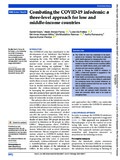Combating the COVID-19 infodemic: a three-level approach for low and middle-income countries

View/Open
Date
2021-01-29Publisher
BMJ JournalsAuthor
Dash, SambitParray, Ateeb Ahmad
De Freitas, Loren
Mithu, Md Imran Hossain
Rahman, Md Mustafizur
Ramasamy, Aarthy
Pandya, Apurva Kumar
Metadata
Show full item recordCitation
Dash, S., Parray, A. A., De Freitas, L., Mithu, M. I. H., Rahman, M. M., Ramasamy, A., & Pandya, A. K. (2021). Combating the COVID-19 infodemic: A three-level approach for low and middle-income countries. BMJ Global Health, 6(1) doi:10.1136/bmjgh-2020-004671Abstract
The COVID-19 crisis has contributed to the development of an ‘infodemic’ that hinders an adequate public health approach to managing the crisis. The WHO defines an infodemic as an ‘overabundance of information—some accurate and some not—that occurs during an epidemic’.1 Fake news, propaganda and conspiracy theories, ubiquitous in the era of social media, have spread since the beginning of the COVID-19 pandemic. Reports suggest that a rumour is three times more likely to be spread in social media than accurate information.2 This is of great concern as it often leads to reduced trust in health institutions and services and impedes the evidence-informed approach in managing the pandemic. The infodemic may also promote hate speech and associated stigmatisation which may contribute to exclusions of vulnerable sections of society.
The adverse effects of the infodemic may be exacerbated in low and middle-income countries (LMICs) where low health literacy levels, poor health infrastructure and poor resource settings exist. One example is the spread of misinformation that concentrated alcohol can kill the novel coronavirus. This led to methanol poisoning that contributed to the deaths of more than 700 people in Iran and resulted in blindness in 60 people in other LMICs.3 Misperceptions about COVID-19 also entail less adherence with proven precautionary behaviours such as social distancing interventions.4 Broad categories of misinformation related to COVID-19 include those about the disease itself, conspiracy theories, scapegoating and false cures. A concerted, tailor-made, evidence-informed effort from a transdisciplinary perspective is required to address the impact of the infodemic in LMICs. In this article, we suggest measures and approaches that LMICs can undertake in order to combat the COVID-19 infodemic and future infodemics.
